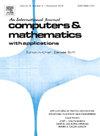Generative adversarial physics-informed neural networks for solving forward and inverse problem with small labeled samples
IF 2.9
2区 数学
Q1 MATHEMATICS, APPLIED
引用次数: 0
Abstract
Physics-informed neural networks (PINNs) provide a deep learning framework for numerically solving partial differential equations (PDEs), but there still remain some challenges in the application of PINNs, for example, how to exhaustively utilize a small size of (usually very few) labeled samples, which are the exact solutions to the PDEs or their high-accuracy approximations, to improve the accuracy and the training efficiency. In this paper, we propose the generative adversarial physics-informed neural networks (GA-PINNs), which integrate the generative adversarial (GA) mechanism with original PINNs, to improve the performance of PINNs by exploiting a small size of labeled samples. The numerical experiments show that, compared with the original PINNs equipped with an additive loss computed on these labeled samples, GA-PINNs can more effectively utilize the small size of labeled samples when solving forward and inverse problems. As a generalization of GA-PINNs, we also combine the GA mechanism with the deep Ritz method (DRM) and the deep Galerkin method (DGM) to form GA-DRM and GA-DGM, respectively. The experimental results validate their superiority as well.

求助全文
约1分钟内获得全文
求助全文
来源期刊

Computers & Mathematics with Applications
工程技术-计算机:跨学科应用
CiteScore
5.10
自引率
10.30%
发文量
396
审稿时长
9.9 weeks
期刊介绍:
Computers & Mathematics with Applications provides a medium of exchange for those engaged in fields contributing to building successful simulations for science and engineering using Partial Differential Equations (PDEs).
 求助内容:
求助内容: 应助结果提醒方式:
应助结果提醒方式:


